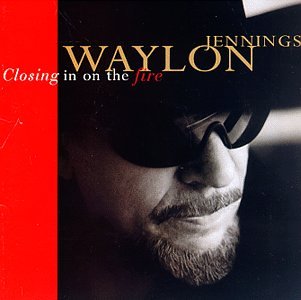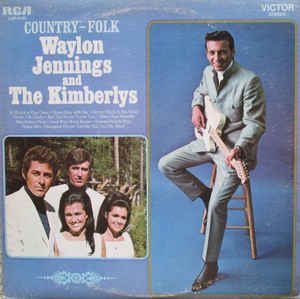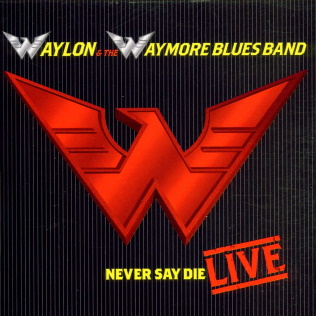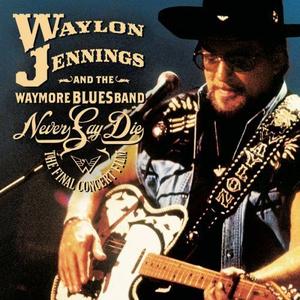
Waylon Arnold Jennings was an American singer, songwriter, musician, and actor. He is considered one of the pioneers of the outlaw movement in country music.

Waylon Sings Ol' Harlan is a 1967 album by American country music artist Waylon Jennings, released on RCA Victor. It consists completely of songs by Harlan Howard.

Closing In on the Fire is an album by American country music artist Waylon Jennings, released on the small Ark 21 Records label on June 16, 1998. It features contributions from several celebrities associated with both country and rock music. The selections include, among others, Sting's "She's Too Good for Me" and Tony Joe White's title track, creating a greater degree of musical eclecticism than in many previous Jennings releases. The singer incorporated elements of genres such as blues and rock, in addition to traditional country ballads. "Best Friends of Mine," an autobiographical song, is a tribute to Buddy Holly, Hank Williams Jr. and Jim Garchow minor league baseball team who was one of Jennings' close friends from Waylon's days in Phoenix. Carl Smith, one of Jennings's idols, appears on "Untitled Waltz." In an interview the singer mentioned that he wasn't fully satisfied with his take on The Rolling Stones' "No Expectations", calling it "a little more contrived than I would have liked." An interview featuring Jennings commenting on the record is included as a bonus track. Closing In on the Fire, Jennings' 72nd release, reached #71 on the country charts and was the last studio album by the singer to be released before his death in 2002.

Folk-Country is the major-label debut album by American country music artist Waylon Jennings, released in 1966 on RCA Victor. It is his first collaboration with producer Chet Atkins.

Country-Folk is a studio album by American country music artist Waylon Jennings featuring the Kimberlys on vocals. It was released in 1969 on RCA Victor.

Waylon is a studio album by American country music artist Waylon Jennings, released in 1970 on RCA Victor.

Lonesome, On'ry and Mean is a studio album by American country music artist Waylon Jennings, released on RCA Victor in 1973. It was, after Good Hearted Woman and Ladies Love Outlaws, the third in a series of albums which were to establish Jennings as one of the most prominent representatives of the outlaw country movement. Photographer Mick Rock shot the album's cover.

Honky Tonk Heroes is a country music album by Waylon Jennings, released in 1973 on RCA Victor. With the exception of the final track on the album, "We Had It All", all of the songs on the album were written or co-written by Billy Joe Shaver. The album is considered an important piece in the development of the outlaw sub-genre in country music as it revived the honky tonk music of Nashville and added elements of rock and roll to it.

This Time is a studio album by American country music artist Waylon Jennings, released on RCA Victor in 1974, at the peak of the outlaw country movement. It was produced by Jennings and Willie Nelson.

Dreaming My Dreams is the twenty-second studio album by American country music artist Waylon Jennings. The album was co-produced with Jack Clement and recorded at Glaser Sound Studios in Nashville, Tennessee, between February and July 1974.

Wanted! The Outlaws is a compilation album by Waylon Jennings, Willie Nelson, Jessi Colter, and Tompall Glaser, released by RCA Records in 1976. The album consists of previously released material with four new songs. Released to capitalize on the new outlaw country movement, Wanted! The Outlaws earned its place in music history by becoming the first country album to be platinum-certified, reaching sales of one million.

What Goes Around Comes Around is a studio album by American country music artist Waylon Jennings, released on RCA Victor in 1979.

Black on Black is a studio album by American country music artist Waylon Jennings, released on RCA Victor in 1982.

A Man Called Hoss is a concept album by American country music artist Waylon Jennings, released on MCA in 1987.

Never Say Die: Live is a live album by Waylon & The Waymore Blues Band, released on Sony Records through the Lucky Dog imprint in 2000. Jennings' third live album – after Waylon Live (1976) – and his last record of original material to be released during his lifetime, it was recorded at Nashville's historic Ryman Auditorium on January 5 and 6, 2000. At that time, Jennings was battling both emphysema and severe diabetes that had forced him to give up the sort of long tours he had always done. The album is credited to "Waylon & The Waymore Blues Band", referring to the singer's backing band, actually a mix of many of his original road band, the Waylors, and additional musicians. The album features a host of guests, including Waylon's wife Jessi Colter and three artists then on Sony: Montgomery Gentry, John Anderson and Travis Tritt. The songs themselves are a mix of original Jennings hits, tracks from his more recent albums and compositions he had never covered. Like 1998's Closing in on the Fire, Never Say Die: Live reached #71 on the country charts. The original 2000 release did not by any means constitute the complete concert, which ran an hour and forty minutes and was recorded by Sony in video. On July 24, 2007, Legacy Recordings, the Sony BMG reissue specialists, released the complete concert including all twenty-two tracks on two CDs and on DVD as well.

Nashville Rebel is a box set by Waylon Jennings, released on RCA Nashville through Legacy Recordings in 2006. According to AllMusic's Stephen Thomas Erlewine, it is "the first comprehensive, multi-label Waylon Jennings retrospective ever assembled," comprising ninety-two songs recorded between [1958 and 1994, with selections from the majority of the singer's recording career. The first track of the box set is the Buddy Holly-produced "Jole Blon," released in 1958, while the last is "I Do Believe," a song produced by Don Was that was included on The Highwaymen's 1995 release, The Road Goes On Forever. The other material on the box set covers Jennings' career chronologically, with songs ranging from his years on RCA's roster to later compositions from his short-lived stay at Epic Records; it ignores, however, the tracks from Jennings albums released on independent labels. The majority of the singer's charting singles are included in the package, as are collaborations such as "Mamas Don't Let Your Babies Grow Up to Be Cowboys" with Willie Nelson and "Highwayman" with The Highwaymen. A notable addition is the previously unreleased "The Greatest Cowboy of Them All," a 1978 duet with Johnny Cash which was later recorded by Cash alone for A Believer Sings the Truth (1979) and The Mystery of Life (1991); two others, "It's Sure Been Fun" and "People in Dallas Got Hair," had never been released in the United States. Nashville Rebel was released on four CDs, with a 140-page booklet and liner notes by Rich Kienzle and Lenny Kaye.

The Waylors, later Waymore's Outlaws, is a country music band, best known as the backing and recording band of country music singer Waylon Jennings. Jennings formed the band in 1961, consisting of Jerry Gropp on the guitar and Richie Albright on the drums after moving to Phoenix, Arizona. The band earned a local fan base during its appearances on the night club JD's.

Never Say Die: The Final Concert is a 2000 concert film featuring Waylon Jennings. Jennings, his health failing, played his last major concert at Nashville's historic Ryman Auditorium in January 2000. He was backed by the all-star Waymore Blues Band, whom Jennings called "the band I always wanted," and joined onstage by his wife Jessi Colter, and by guests John Anderson, Travis Tritt and Montgomery Gentry.

Ralph Eugene Mooney was an American steel guitar player and songwriter, he was inducted into the Steel Guitar Hall of Fame in 1983. He was the original steel guitarist in Merle Haggard's band, The Strangers and Waylon Jennings's band, The Waylors.
Robby Turner is an American pedal steel guitarist, best known for his work with Waylon Jennings and his contributions to recordings by many other artists.




















